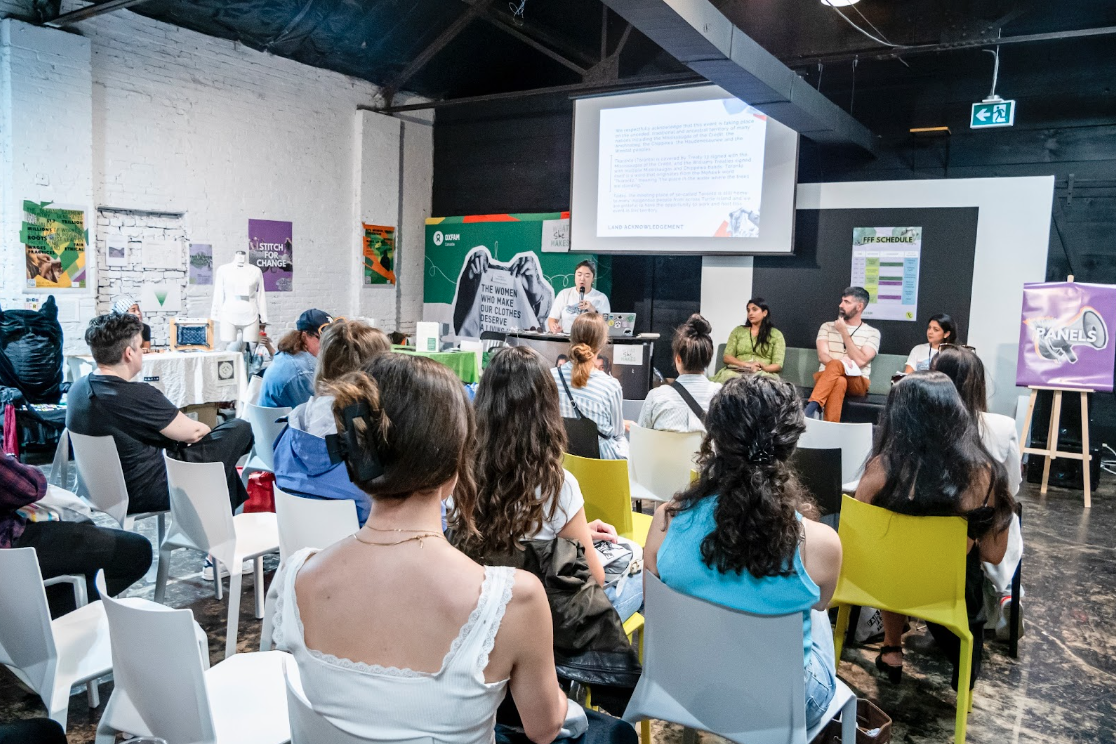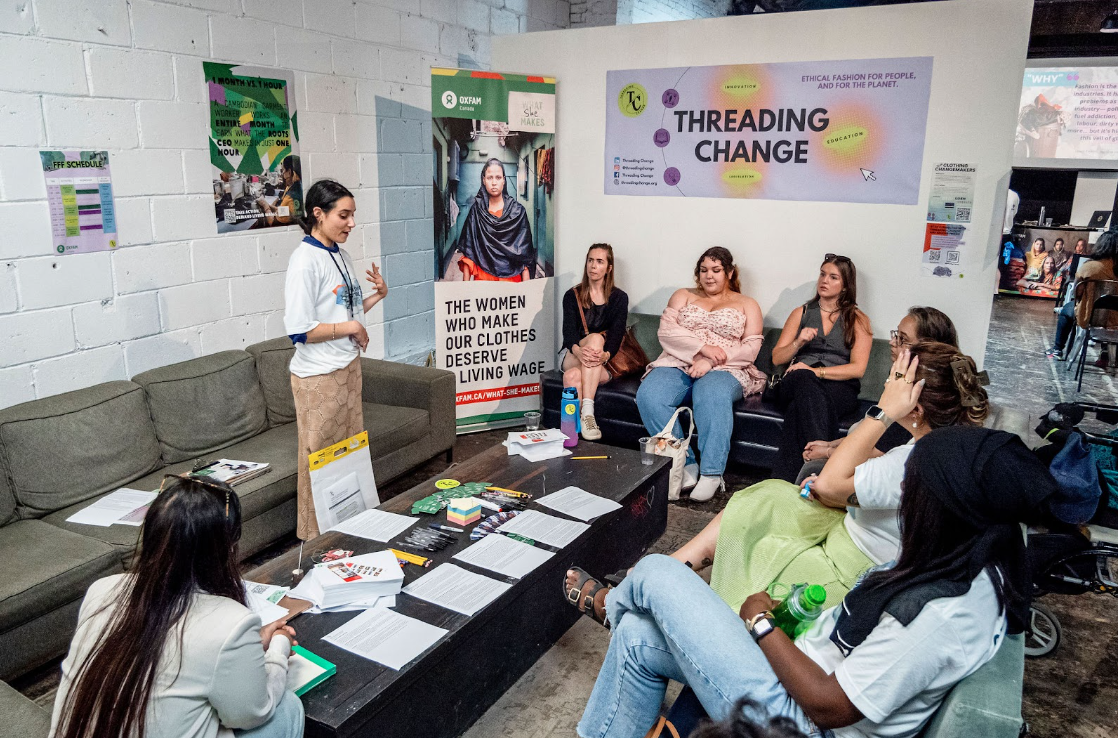FFF Toronto and Halifax Recap
Written by Sara McQuaid, Creative Content Specialist @ Threading Change
October 2, 2024.
5-minute read.
There’s something undeniably powerful about the act of bringing people together. Whether in our homes, workplaces, or public parks, the shared energy of gathering for a common purpose sparks a unique sense of excitement. Festivals, in particular, have been a cornerstone of human connection for thousands of years, uniting people in celebration, culture, and community.
At Threading Change, we aim to facilitate innovative festivals that promote fairness, encourage collaboration, and embrace creativity. Threading Change’s Fair Fashion Festivals equip audiences with the necessary resources and tools to adopt sustainable lifestyles and work toward a more conscious, ethical, and fossil fuel-free fashion future. These unique events feature various innovative and educational components, including panels, workshops, mending stations, and clothing swaps. A highlight is our Museum of Changemakers, which showcases organizations committed to taking action against climate change and fulfilling the United Nations Sustainable Development Goals.
In today’s blog post, we’re taking a moment to reflect on two of our most impactful events to date: the Toronto and Halifax editions of our Fair Fashion Festival. Join us as we celebrate the success of these incredible events and the passionate individuals who made them possible.
TORONTO EDITION
The Toronto edition of the Fair Fashion Festival took place on Saturday, August 17th, at Bevy on Dundas Street. From 1 to 6 pm, attendees enjoyed a vibrant clothing swap, insightful panels, and engaging exhibitions, followed by a special networking session and dance party from 7 to 9 pm. Thanks to our amazing partnership with Oxfam Canada, we were able to offer this event completely free to attendees!
Upon entering Bevy, it was hard to know where to start! To the right, we had Threading Change’s popcorn station, where attendees could support our mission with a donation and enjoy some delicious salty snacks. Next to it was the Mending Station, featuring Shared Bag Mending, where participants learned valuable clothing care and repair techniques under expert guidance. Sensational vendors like Lucky Duck Thrift and MakeSomethingK captivated attendees with vibrant displays of sustainable products, adding even more excitement to the event.
Then there was our free refreshment zone, kindly provided by Oxfam, featuring delicious food from Vert-Casse-Croûte Inc.
On the left side of Bevy, we featured our Community Quilt, offering attendees a quiet space for reflection amidst the event’s energy. The quilt posed a thought-provoking question: “What is one thing you want to change about the fashion industry?” Attendees wrote their responses on pieces of masking tape and stitched them onto the larger quilt. This simple act of sewing symbolized a connection between the individual and the fashion industry, serving as a powerful reminder of the immense labor involved in creating each garment.
It was impossible to overlook the Museum of Changemakers, which spotlighted two remarkable organizations driving real change in the fashion industry. Fashion Revolution challenges brands and companies that prioritize profit over people, while From Here to Wear, a Toronto-based initiative, educates the public on the environmental dangers of textile waste.
The festival was filled with valuable educational moments, including two thought-provoking panels that addressed systemic injustices within the fashion industry.
The first panel, “What the Fashion Industry Doesn’t Want You to Know”, hosted by Oxfam, featured Gayathri Krishna, PhD candidate at McMaster’s School of Labour Studies; Shane Moffet, Executive Director of the Canadian Network for Corporate Accountability; and Nirvana Mujtaba, Women’s Rights and Policy Specialist at Oxfam. Together, they shed light on critical issues such as wage disparity and greenwashing tactics. Nirvana drove the point home, stating:
“The fashion industry profits from a model that exploits garment workers, primarily women, who endure poverty wages, unsafe working conditions, and gender discrimination. While women work long hours for as little as $6 a day, top Canadian fashion executives earn over $42,000 daily.”
The second panel, “ChangeMaking in Fashion” hosted by Threading Change, featured Laura McClure, Program Director of Fashion Takes Action; MD Arafat Ali Khan, Designer and Research Assistant at Seneca Polytech; and our founder, Sophia Yang. They explored ways to drive sustainable change within the fast fashion landscape. In a memorable moment, Sophia asked the audience if they had ever purchased fast fashion. When hands hesitated, she raised hers first and said, “I did. There’s no shame in that. You can’t know what you didn’t know. Now we know, and we move forward.”
The festival featured hands-on educational activities like Oxfam’s “Stitch for Change Challenge,” where participants tried sewing t-shirt hems, simulating the intense workload of Cambodian garment workers. As Oxfam writes:
“This unique one-minute sewing challenge invites consumers like you and me to experience the stark contrast between the lives and compensation of Cambodian garment workers and fashion brand CEOs. Within just 60 seconds, participants will be tasked with sewing 10 t-shirt hems, mirroring the intense workload that the women who make our clothes endure daily for poverty wages”
There were also sitting circle styled workshops led by Isabelle Sain on textile waste and Environment Canada’s Consultation Program, where attendees engaged in open discussions about textile waste challenges and solutions. Sain commentedhat attendees shared that the vast majority of people who participated expressed the need for comprehensive and overarching legislation and building in of policy mandates and Many wanted micro fibre pollution to be properly addressed.
In the Clothing Swap corner, over 50 attendees exchanged gently used items while participating in our clothing audit, which provided insights into the wear and condition of each piece before it was swapped. Many attendees mentioned this wasn’t their first swap, expressing excitement for future opportunities to participate.
The evening concluded with a lively dance and mingle session, with DJ Lycee spinning beats as attendees and organizers celebrated the festival’s success.
A special thank you to Oxfam for their crucial role in bringing the Fair Fashion Festival to Toronto and for their continued efforts to protect garment workers and their rights!
HALIFAX EDITION
The Halifax edition of the Fair Fashion Festival took place on Saturday, September 14th, in partnership with Charlotte Genge of The Great Halifax Clothing Swap. Hosted at the Dalhousie Student Union from 10 am to 4 pm, the event drew over 250 participants. Admission was $15 with a clothing donation and $25 without, with all proceeds supporting Threading Change's expansion projects.
On the second floor, attendees were greeted by a massive Museum of ChangeMakers. Exhibitors included: ClimAtlantic, Back to the Sea Society, Oxfam Canada, Fusion Halifax, Nova Scotia Environmental Network, Wild!Outside, Halifax’s Regional Municipality's Waste Management Department, Laura Chenoweth Organic Fabrics and Cecilonia Design.
In the far-right corner, Anita Cazzola offered a mending workshop where participants could join a group quilt or receive individual guidance on garment repair. This workshop emphasized the value of slow fashion and provided a mindful space for attendees to connect and share ideas.
Next to her, we brought the Community Quilt with us from Toronto! This quilt will travel everywhere across Canada and learn more from participants across the country. The quilt is expected to go to Montreal next: where will you be joining us in 2025?
In the McInnes Room, the Great Halifax Clothing Swap, led by Charlotte Genge, processed 2,500 pounds of clothing,, extending the life of garments and avoiding landfill waste. Genge has been running clothing swaps since 2008 in her hometown of St. John’s Newfounland and has been on a mission to bring sustainable and circular fashion in communities across the East Coast. Stay tuned for more information on her incredible, coming to the TC blog soon!
Two engaging panels were held in the Council Chambers. The first, “Changing the Tides: Understanding the Ocean’s Plastic Crisis,” featured Sera Thompson and Ally Chant from Halifax Regional Municipality’s Waste Division. They discussed the issue of microplastics and emphasized the importance of resilience through collaboration among like-minded groups. The second panel, “From Waste to Community Wealth,” highlighted community-driven initiatives aimed at addressing the textile crisis and promoting a circular economy.
The day was alive with energy, particularly at Murdock’s Fish and Chips, which served up Halifax’s finest poutine and snacks.
CONCLUSION
Panelist Nirvana beautifully summarized the events:
“The Fair Fashion Festival combined awareness and action. The museum, panels, and challenges empowered participants to take meaningful steps toward a more just and ethical fashion industry.”
The festivals in Toronto and Halifax served as essential platforms for raising awareness about textile waste and the broader impact of the fashion industry. Through engaging panels, workshops, and discussions, attendees were inspired to appreciate the significance of local initiatives and collective action. Together, we can build a more sustainable and equitable future for both the fashion industry and our communities.
Where would you like to see our next Fair Fashion Festival? Interested in getting involved? We’d love to hear from you! Send us a message on Instagram, and let’s connect.
Edited by: Luiza Giocondo Teixeira, Communications & Engagement Director @ Threading Change
Sara McQuaid
Sara is a writer and teacher currently working in Montreal, Quebec. She has a Honours Bachelor degree in History from Trent University and a Master's Degree in History from KU Leuven, focusing on women's history. Her passion for understanding contemporary challenges and love of fashion has inspired her to shift into the sustainable industry. She hopes to shape history by helping to change the future of fashion into one that is fossil-free and equitable.















